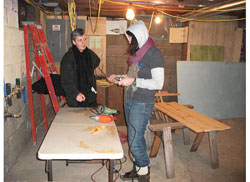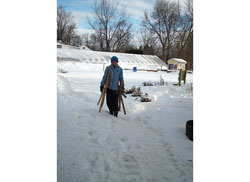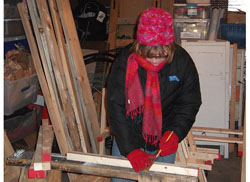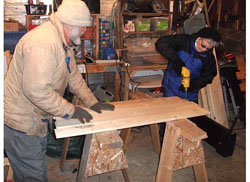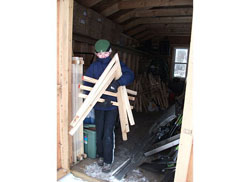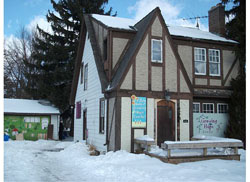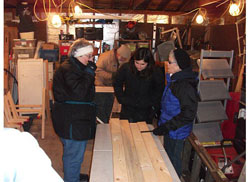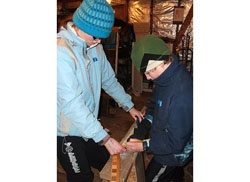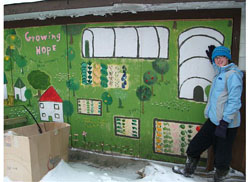WELCOME!
... To a faith with the power to transform lives and change the world. ... To a faith that can sustain and enrich the next chapter of your life.
Highlighted Events
EET: Growing Hope Work Day
Growing Hope Work Day 2/12/11
It was bitter cold outside and not a lot warmer inside the garage at the Growing Hope Center on Michigan Avenue in Ypsilanti. Despite bone-chilling temperatures on Saturday, February 12, the sun was shining and everyone seemed to be wearing a smile (and a hat and gloves!) as they worked together preparing seed starting kits. Although most of us thought we'd have our hands in the soil at this Ethical Eating Team action workday, we were needed on a much different activity - measuring and drilling holes in the lumber used to make seed starter frames to hold the plants and grow lights. Following a tour of the property, including the house that will become their future offices, the existing hoop house and garden area, our volunteer coordinators led us through the basics and we completed our work assignments in about half the time allocated. Yes, it was cold, but it was fun and worthwhile. Our sincere thanks go to the 15 or so volunteers of all ages who joined us. There are many things our team members could have been doing that day, but we all chose to work together for a great cause, Growing Hope.
|
|
|
|
|
Terri drills holes in frames in the basement with the |
|
Meg carrying frames to the shed |
|
|
|
|
|
Colleen trying to measure with gloves on. |
|
Rich and Kathy work well together. |
|
|
|
|
|
Frames |
|
Alex: frame carrier. |
|
|
|
|
|
Growing Hope is all heart! |
|
Growing Hope's home. |
|
|
|
|
|
Becky, Kathy and a G.H. staff trying to keep warm |
|
Meg and Alex may have found their niche! |
|
|
|
|
|
Meg shows us the mural. |
|
Art on the wall. |
|
|
|
|
|
Hopeful shed. |
|
We were all stars! |
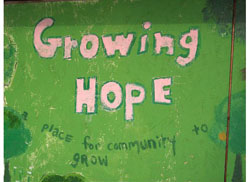 |
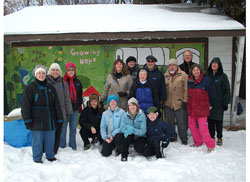 |
|
|
Growing Hope: A place for community to grow. |
The whole team |
Ethical Eating Team: Amish Farm Tour
 |
Amish Farm Tour
Cathy Muha
 I spent a day in Amish country near Hillsdale as part of a Michigan Agritours excursion. The focus of the tour was the intersection of food and spirituality.
I spent a day in Amish country near Hillsdale as part of a Michigan Agritours excursion. The focus of the tour was the intersection of food and spirituality.
We spent the morning in an old Amish farmhouse now owned by a non-Amish man, an engineer who purchased the home and acreage to farm and to teach youth about both farming and ecology (he has a wind turbine and solar panels and plans to go off the grid).
 Our lunch was delivered to us by Maggie, a young Amish woman from across the street, where we would spend most of the afternoon. Everything we ate was grown and produced by Maggie's family, from the sausage to the milk. We dug into our lunch without pause, and it was delicious.
Our lunch was delivered to us by Maggie, a young Amish woman from across the street, where we would spend most of the afternoon. Everything we ate was grown and produced by Maggie's family, from the sausage to the milk. We dug into our lunch without pause, and it was delicious.
After lunch, we walked across the street and met the rest of Maggie's family: husband and six children, plus Maggie's mother and sister, who were helping with the cooking. The children were quiet, though they seemed quite confident. Grandma said confidence comes with being a part of the running of the farm, and the children were indeed expected to work all day, along with their parents. Play was sprinkled in, though. The oldest boy batted a whiffle ball around as he did his chores. We experienced the entire family singing happy birthday to Joseph, who was turning seven. The song was in German and was not the birthday melody we know. It was sung in rounds for quite a long time. Joseph beamed, some of us cried it was so lovely.
Maggie took us to the basement to see her canned goods – shelves and shelves groaning under the weight (though it was hard to see, with no lights). Then we went to the garden, source of all the preserving, and of course, very large. We also saw the cows in the pasture, and the turkeys and ducks in front of the barn. We learned that the entire family is up at 4:30 every morning, and Maggie and her husband aren't to bed until 10:30 at night.
 We went back across the street and Maggie delivered our dinner. This time we did pause before we ate, and reflected on where our food had come from. Maggie and her family had told us that they were only a part of the food production, and that it started with God. We each had our own thoughts about that, but what we did know was that the food didn't come to us easily. We discussed how food is almost always involved when people congregate. When home-cooked, a part of the cook is in the food. I intend to be more mindful of the source of my food whenever I eat.
We went back across the street and Maggie delivered our dinner. This time we did pause before we ate, and reflected on where our food had come from. Maggie and her family had told us that they were only a part of the food production, and that it started with God. We each had our own thoughts about that, but what we did know was that the food didn't come to us easily. We discussed how food is almost always involved when people congregate. When home-cooked, a part of the cook is in the food. I intend to be more mindful of the source of my food whenever I eat.
Ethical Eating Team: Action Items from Food, Inc.
Return to EET Home Page
 1. Stop drinking sodas and other sweetened beverages.
1. Stop drinking sodas and other sweetened beverages.
You can lose 25 lbs in a year by replacing one 20 oz soda a day with a no-calorie beverage (preferably water).
2. Eat at home instead of eating out.
Children consume almost twice (1.8 times) as many calories when eating food prepared outside the home.
3. Support the passage of laws requiring chain restaurants to post calorie information on menus and menu boards.
Half of the leading chain restaurants provide no nutritional information to their customers.
4. Tell schools to stop selling sodas, junk food, and sports drinks.
Over the last two decades, rates of obesity have tripled in children and adolescents aged 6 to 19 years.
5. Meatless Mondays-Go without meat one day a week.
An estimated 70% of all antibiotics used in the United States are given to farm animals.
6. Buy organic or sustainable food with little or no pesticides.
According to the EPA, over 1 billion pounds of pesticides are used each year in the U.S.
7. Protect family farms; visit your local farmer's market.
Farmer's markets allow farmers to keep 80 to 90 cents of each dollar spent by the consumer.
8. Make a point to know where your food comes from-READ LABELS.
The average meal travels 1500 miles from the farm to your dinner plate.
9. Tell Congress that food safety is important to you.
Each year, contaminated food causes millions of illnesses and thousands of deaths in the U.S.
10. Demand job protections for farm workers and food processors, ensuring fair wages and other protections.
Poverty among farm workers is more than twice that of all wage and salary employees.
Ethical Eating Team: Hunger Among Us Panel Discussion
 On Sunday, May 9, we celebrated Mothers' Day by bringing awareness to our community of who the hungry are in Washtenaw County, and what organizations are working to empower them.
On Sunday, May 9, we celebrated Mothers' Day by bringing awareness to our community of who the hungry are in Washtenaw County, and what organizations are working to empower them.
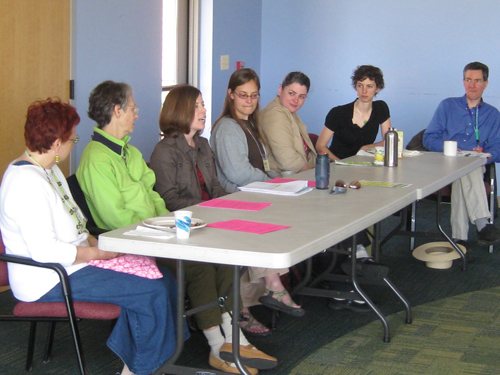 Sarah Walsh Ross envisioned the event and co-coordinated it with John Erdevig, consultant with EET and organizer of the Good Food Garden at the UUAA church. Lucia Heinold worked on the committee, as well, supplying food, contacting panel members, etc.
Sarah Walsh Ross envisioned the event and co-coordinated it with John Erdevig, consultant with EET and organizer of the Good Food Garden at the UUAA church. Lucia Heinold worked on the committee, as well, supplying food, contacting panel members, etc.
John introduced the event by asking us to ponder:
How do limited household resources and food options push our Washtenaw County neighbors into unhealthy diets? Sometimes, paradoxically, uneconomical diets? What is being done locally to create systems that make healthy food available to people with limited income, transportation, or with physical limitations?
Sarah handed out a role-play, in which attendees were compelled to think about how to access healthy food with a reasonable expenditure of limited time and resources.
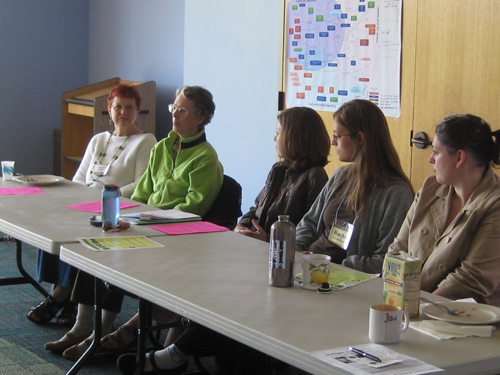  |
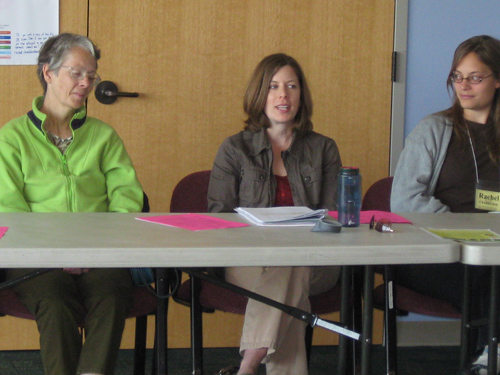  |
| (far left) Mary Alice Helmic (UUAA) and Shirley Ramsey, both residents of Towne Centre in Ypsilanti, showed how they're promoting community gardening at this Ypsilanti senior and disabled high-rise. They discussed how accessible gardening is a benefit to physical and mental health. | (center) Jenna Bacolor (UUAA), of Washtenaw County Public Health, talks about their program, "Prescription for Health", where doctors gave tokens to the farmers markets, which brought people who may never have known about it to a place where they could get healthier foods. |
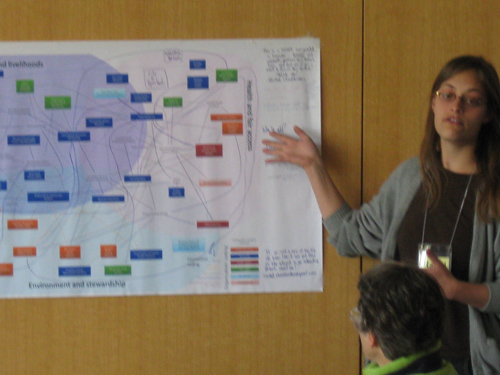  |
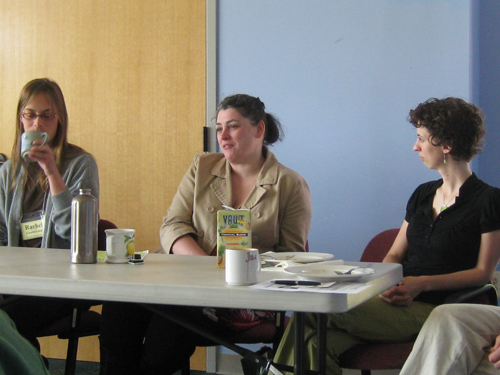  |
| Rachel Chadderdon (UUAA), Grad Student at the School of Nat. Resources, UM, showed us the Washtenaw Cty. Food Map that shows local feeding and food agencies. | (center) Missy Orge, Director of Outreach and Training discussed Food Gatherers and their initiatives to connect low-income community members with healthy foods. Shetalked abouttheir Gathering Farm, as well as their Community Kitchen. |
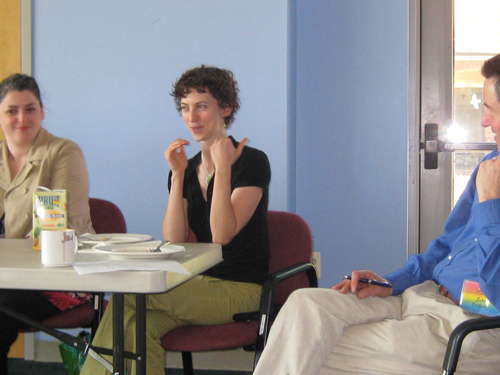  |
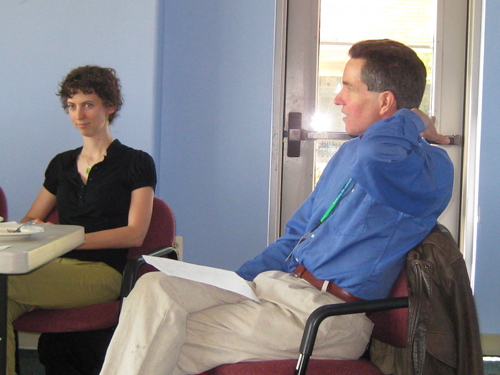  |
| Amanda Edwards, Executive Director of Growing Hope in Ypsilanti, discussed how they haveworked to have the Ypsilanti Farmers Mkt. be the 3rd in the state to accept food stamps. She talked about what Food Security means. | John Erdevig introduced the panel, talked a bit about the church's Good Food Garden, and summarized what we'd heard. |
Ethical Eating Team: Michael Pollan
Food Writer Michael Pollan Visits Zingerman's Roadhouse
 On April 11, Michael Pollan joined the Zingerman's Roadhouse gang and Chris Bedford, Michigan Food Filmmaker, to talk about his favorite topic: food. I joined about 100 lucky people to eat Zingerman's food - mostly Michigan-sourced - and hear what he had to say.
On April 11, Michael Pollan joined the Zingerman's Roadhouse gang and Chris Bedford, Michigan Food Filmmaker, to talk about his favorite topic: food. I joined about 100 lucky people to eat Zingerman's food - mostly Michigan-sourced - and hear what he had to say.
He discussed food shed assessments - that we need to do an overview of what food sources we have in our region, and whether there are gaps. He defended conventional farmers, saying that the organizations representing them are often not doing things that benefit them. Monopolies in farming threaten both eaters and farmers.
Pollan believes that the new food movement creates an alternative economy, with structures such as farmers markets, that eliminate the middleman. He says we need to diversity both economically and biologically.
He feels that organic farming should be subsidized, as conventional farming currently is. If it was, organic food would be more affordable for all. As it is, Pollan calls some of our inner cities "food deserts", with very few grocery stores. If tax incentives were offered to build groceries in inner cities, there would be many more food choices there. Also, when farmers market vouchers are put in inner cities, the farmers markets will follow.
When asked about microwave ovens, Pollan said he feels that they have changed eating in America. They've destroyed family dinners, in that each person has his or her own entree', and they're heated and eaten at different times. He feels that all eating the same thing is important to a family.
Pollan feels the way we get our food now - often being trucked thousands of miles - is unsustainable. Once oil prices go up, and water is scarcer (for irrigation on a large scale), things will change. We need to build up alternatives now so when the breakdown comes, we can still eat. He mentioned Joel Salatin, owner of Polyface Farm featured in Pollan's "Ominvore's Dilemma". He feels that Salatin's methods and philosophies of food production and distribution (local) is the tip of a reformation.
-Cathy Muha
Ethical Eating Team: The Greening of St. Joe's Hospital
Hoop House Aims to Grow a Greener, Healthier Future
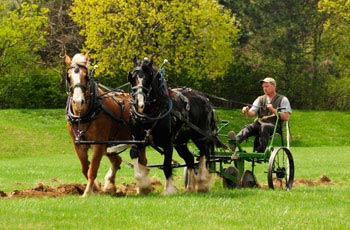 St. Joseph Mercy Ann Arbor is staying ahead of the times by returning to its roots. On a chilly, misty morning last week, a team of workers constructed a solar-warming 'hoop house' to grow tomatoes, peppers, and other vegetables.
St. Joseph Mercy Ann Arbor is staying ahead of the times by returning to its roots. On a chilly, misty morning last week, a team of workers constructed a solar-warming 'hoop house' to grow tomatoes, peppers, and other vegetables.
When the land yields crops later this summer, the produce will be included in hospital food and sold at a farmer's market on campus.
A century ago, farmers plowed the ground and raised crops where St. Joseph Mercy Ann Arbor's 364 acre campus is today. On April 14, a horse-drawn plow tilled a four-acre plot under the shadow of the new North Tower in a field near Clarke Road.
See Channel 7 news coverage >>
"We are excited to be able to use the land in its original form." said Rob Casalou, president and CEO of St. Joseph Mercy Ann Arbor, Saline and Livingston, adding that produce not sold will be donated to Food Gatherers of Washtenaw County.
To start, the hoop house and garden will grow vegetables including tomatoes, basil, broccoli, lettuce and peppers. Dan Bair, a local farmer contracted by St. Joe's, will tend to the land and run a farmer's market, initially set to be held two days a week at the hospital.
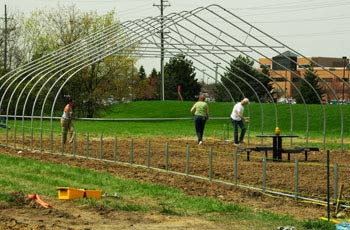 "When it comes to healthy eating, one of the most difficult aspects for people is finding quality produce at reasonable cost," says Lisa McDowell registered dietitian, St. Joseph Mercy Ann Arbor. "We get many consultation requests from patients hoping to lose weight and begin living healthier lifestyles. Opening a farmer's market featuring home-grown produce is a great way to enhance the healthy eating habits of people in our community."
"When it comes to healthy eating, one of the most difficult aspects for people is finding quality produce at reasonable cost," says Lisa McDowell registered dietitian, St. Joseph Mercy Ann Arbor. "We get many consultation requests from patients hoping to lose weight and begin living healthier lifestyles. Opening a farmer's market featuring home-grown produce is a great way to enhance the healthy eating habits of people in our community."
St. Joseph Mercy Ann Arbor erected the first hoop house and planted one acre of farmland on April 13; the second hoop house will follow in July. At the end of the project, St. Joseph Mercy plans to have 12 hoop houses and a fruit orchard on the campus.
"Initially, we will sell the produce at a farmer's market held at the hospital and donate produce to Food Gatherers," explained Casalou. "As the farmland expands, we will integrate the vegetables grown on our land to the cafeteria and patient menus. This is an opportunity for us to live our mission and provide healthy food to the people in need throughout our community."
EET: Calder Dairy Visit

About 35 UUs and friends toured the Calder Dairy on Saturday, April 17. It was a bit nippy, but that didn't stop us from learning a lot AND enjoying some delicious ice cream!
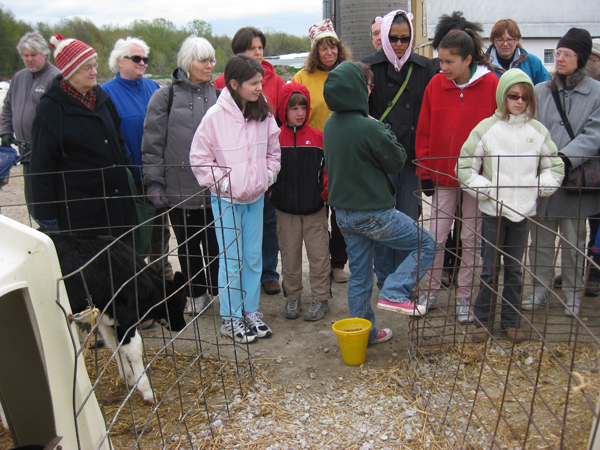 |
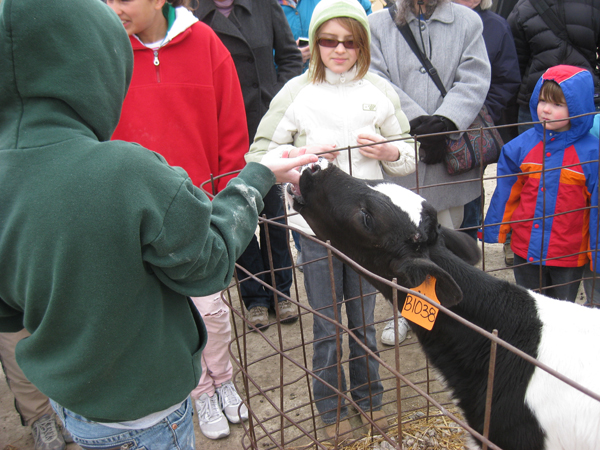 |
|
| Sara, our guide, spent a lot of time with us. | We got to feed a calf! | |
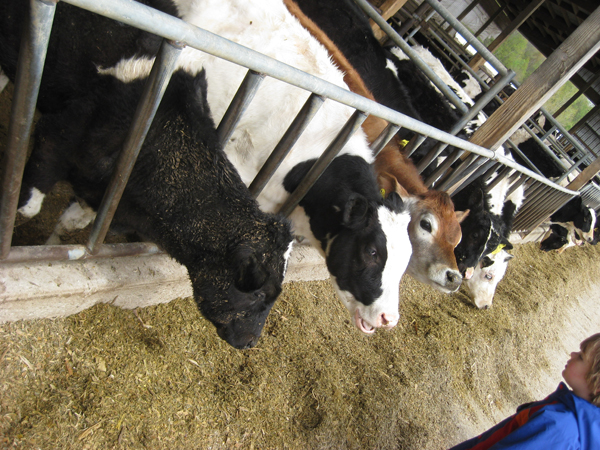 |
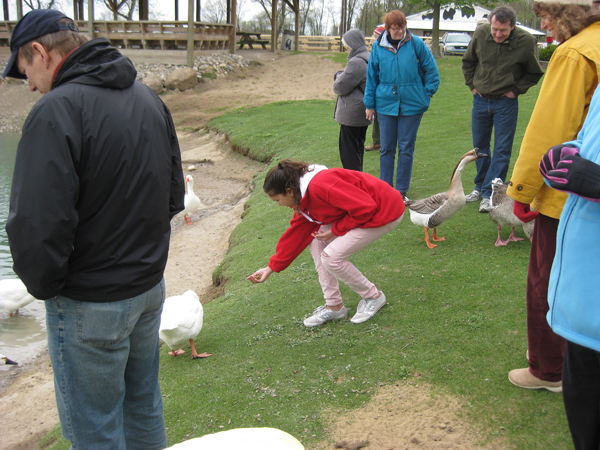 |
|
| Open-air "transition barn", where the young ones live. |
The geese were excited to see us with food. | |
Food Justice: Resources
Politics of Food
foodpolitics.com - Food Politics
foodandwaterwatch.org - Food & Water Watch
Vegetarian/Vegan
uuam.org - UU Animal Ministry
NutritionFacts.org - videos with the latest nutrition news
veganmd.org - Michael Greger, M.D. - physician, author, speaker on public health issues
PCRM.org - Dr. Neal Barnard - recipe archives, cancer project, etc.
VegMichigan.org - local vegetarian issues
https://www.howtocook.recipes/a-guide-to-vegan-baking-banana-bread-peanut-butter-cookies-and-other-treats/ A guide to vegan baking
Ethical Eating Study:
Unitarian Universalist Association of Congregations Ethical Eating Study Guide
 Summary of the EET submitted to UUA (Colleen Crawley)
Summary of the EET submitted to UUA (Colleen Crawley)
EET World Cafe:
Summary of book discussion: "In Defense of Food" (Stephanie Minerath)
Summaries of 3 Grocery Tours:
- Whole Foods (Cathy Muha)
- Meijer (Cathy Muha)
- People's Food Co-op (Colleen Crawley)
Summary of Sustainable Farming panel discussion (John Erdevig)
Alison Paine's "What is Sustainable Farming?" discussion
Recipes from the Tofu Cooking class (Chris Kelly)
Resulting in showing of Food, Inc.:
- See Food, Inc. Website: http://www.foodincmovie.com/index.php
- Chairpersons of Michigan government committees to contact about farm and food issues:
-
House Committee on Agriculture -- Chairman Mike Huckleberry
Lansing Office Mailing Address:
S 1089 House Office Building
P.O. Box 30014
Lansing, MI 48909-7514Phone: 517-373-0834
E-mail Address:This email address is being protected from spambots. You need JavaScript enabled to view it.
Senate Committee on Agriculture and BioEconomy – Chairman Gerald VanWoerkom
Lansing Office Mailing Address:
605 Farnum Bldg.
P.O. Box 30036
Lansing, MI 48909-7536Phone: 517-373-1635
Email Address:This email address is being protected from spambots. You need JavaScript enabled to view it.
-
Food/farming articles in online Grist Magazine:
- Parable on the National School Lunch program
- Cafeteria Confidential, by Ed Bruske
- How our food system is destroying the nation's most important fishery
- The dark side of nitrogen
- Whatever happened to the government's war on raw milk?
- Why a meal for 4 at MacDonald's should cost $75
- New study comparing high fructose corn syrup to table sugar: yes, it's worse
- Shopping mall in Cleveland transformed into greenhouse and farmers market
- A view into the U.S. diet, by Tom Philpott
- With a bit more cash and lots of ingenuity, school lunches could be much better, but Ed Bruske
- In a D.C. school, the simple power of a good breakfast, by Ed Bruske
- Michael Pollan's visit to Ann Arbor, by Cathy Muha
- The Greening of St. Joe's Hospital
- Hunger Site - visit it and they'll donate a cup of food to the hungry
- World Peace Diet, daily VegInspiration

 NEW TO UUAA?
NEW TO UUAA?
